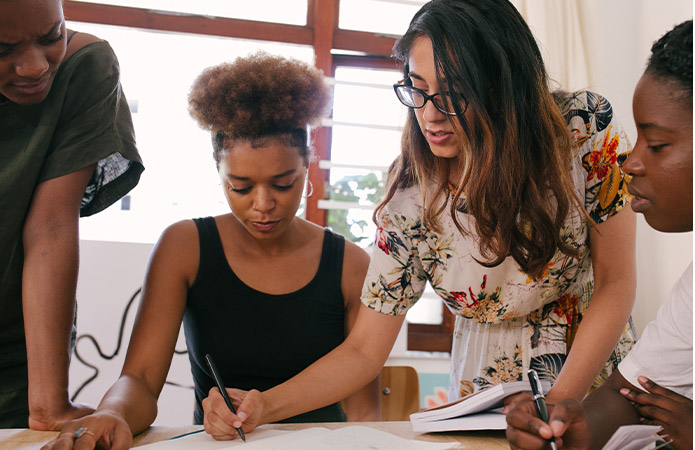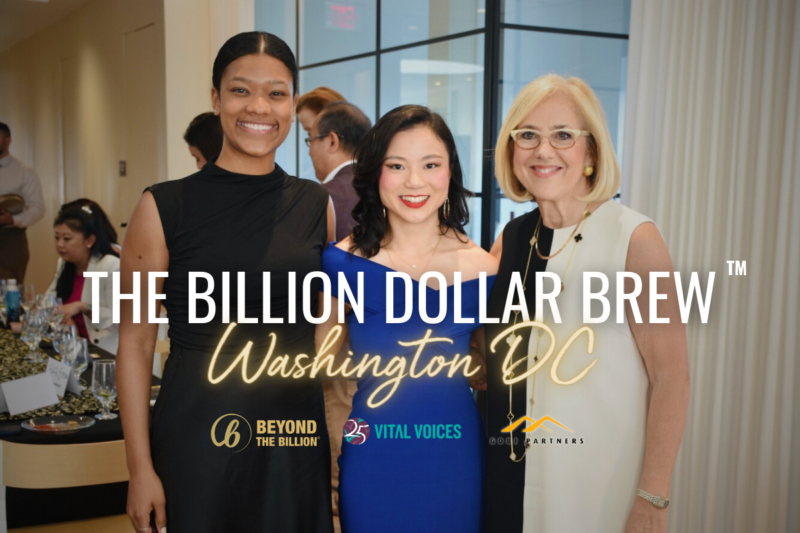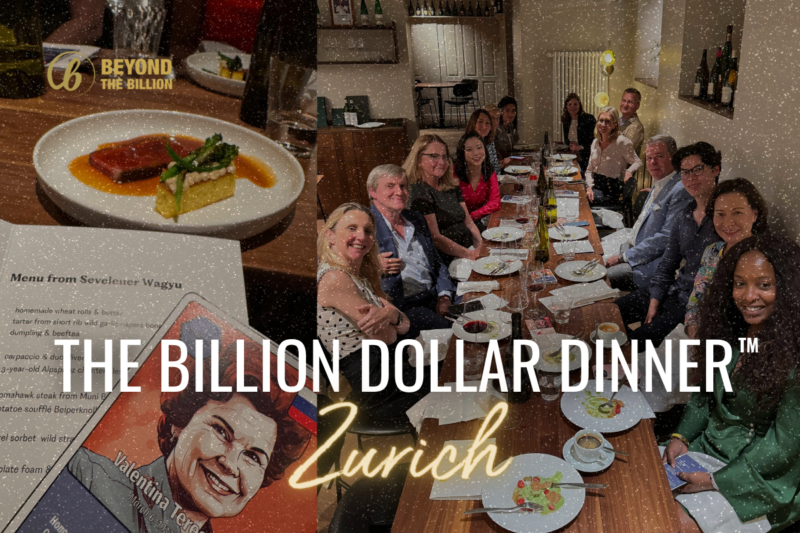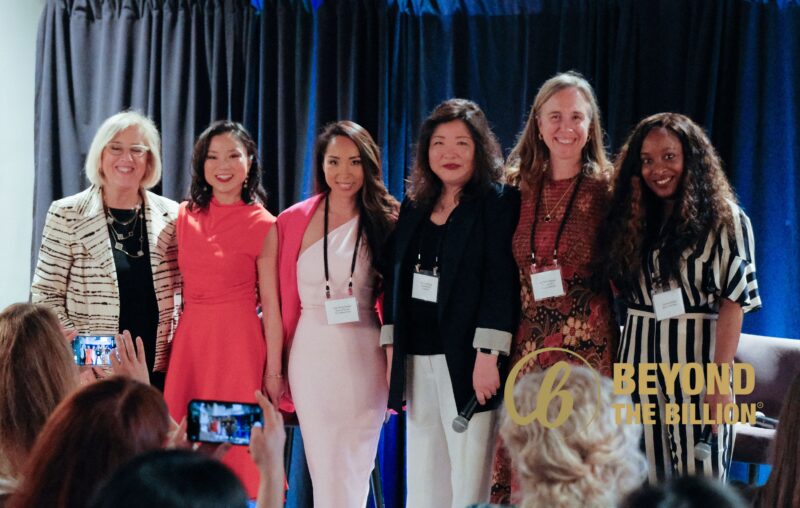By: Janine Marderian
In partnership with Mastercard, Beyond the Billion™ (BTB), a global consortium of venture funds that have pledged more than $1 billion to be invested into women-founded companies, hosted a conversation with a panel of expert changemakers who are creatively and strategically building a more inclusive and equitable innovation ecosystem.
The events of the last few months have prompted individuals, corporations, and policymakers across the United States to face the systemic inequities that pervade our society. Conversations in this time of racial reckoning have focused on correcting these inequities and achieving better outcomes for those who have been and still are marginalized. Vague, feel-good statements of support are no longer sufficient — substantive change is rightfully expected of those in positions of power, authority, and influence. Every sector must grapple critically with what this looks like in its particular context and the venture capital and innovation community are no exception.
Where and how do our existing structures produce barriers for diverse actors? Whose voices are absent from and what perspectives are underutilized within the innovation mainstream? What tangible actions can individuals and institutions take to create a more inclusive innovation ecosystem?
To answer these questions, our second Billion Dollar Bytes™ event convened Mastercard Senior Vice President Marla Blow, GoodWorld’s Dale Pfeifer, VestedWorld’s Founder and Managing Director Euler Bropleh, and Portfolia’s Board Chair and former Rockefeller Foundation President, Dr. Judith Rodin. The takeaways from each of their creative approaches can be leveraged across sectors and industries to move the needle on inclusivity and tap into valuable market opportunities.
1. Building Inclusivity Requires an Intentional Expansion of Access (Capital, Networks, Information & Resources) (Capital, Networks, Information & Resources)
As the Senior Vice President for Social Impact in North America, Marla Blow directs Mastercard’s philanthropic efforts through the company’s Center for Inclusive Growth. Mastercard has been a leader in inclusive innovation by running initiatives like Start Path, a global startup engagement program, investing selectively in funds that prioritize inclusion and providing philanthropic capital to groups that do not meet the expectations for traditional investments. All of these tools open up new pathways where it is traditionally difficult to access capital.
This access to capital, as well as access to networks and other resources, plays a critical role at every point in the venture ecosystem. The lack of access for women and other diverse groups directly translates to the disproportionately low representation we see in the data: despite outperformance, less than 3% of venture funding goes to women-founded companies, and only another 12% is invested in gender-diverse teams. Founders of color are as or more impacted than women as a whole, despite the fact that Black women are starting more businesses relative to any other demographic group.
Despite the unequal access that underpins the drastically disproportionate funding realities, Blow is encouraged by the network of organizations that is changing the demographics on the investor side of the equation. She explained that expanding the field and types of investors necessarily expands the range of investment recipients as overlooked or untapped opportunities rise to the surface. Diverse investors are more likely to recognize how founders are or are not meeting the unmet or underserved needs of diverse and minority consumer groups.
2. Examine the Biases and Structures that Inherently Exclude Women
Successful startup founder Dale Pfeifer spoke to a variety of specific challenges women entrepreneurs face when seeking funding. Her company, Goodworld, started when Pfeifer recognized that the new generation of donors differs from the previous one: instead of a few checks in large increments, young philanthropists often give to multiple different causes in regular, small amounts. Pfeifer saw this unmet need and leveraged social media to reimagine the infrastructure of philanthropy and facilitate faster, more powerful giving. Goodworld has since expanded its offerings to include a suite of fundraising tools that can be utilized by non-profits, as well as services that help larger corporations scale their Corporate Social Responsibility (“CSR”) efforts. Most recently, in response to COVID-19, Goodworld has partnered with Mastercard and the City of Los Angeles to create the Angeleno Campaign, which provides direct and immediate financial assistance for individuals and families experiencing extreme financial hardship as a result of the pandemic.
Despite Goodworld’s incredible success, Pfeifer described the challenges women founders face, from the perceived discomfort in technical areas to the precipitous drop in funding in the later stages. If individuals and institutions are committed to increasing access, they must identify and address how women and other diverse founders are socialized differently and are in turn perceived differently from their peers. Programs like Mastercard’s Start Path (which Pfeifer and Goodworld participated in) that are cognizant of specific structural barriers can drastically improve outcomes for under-represented founders and increase the likelihood that good ideas reach the market.
3. Vanilla Venture Capital is Not the Only Option
In 2014, Euler Bropleh founded VestedWorld (a BTB Partner Fund) with the goal of catalyzing sustainable economic growth by increasing the flow of capital into developing countries. In many cases, Bropleh noted that women are uniquely positioned to creatively provide solutions to unmet needs of overlooked groups. However, Bropleh found that executing the fund’s vision required rethinking the actual structure of capital. The traditional venture model, predicated on relatively binary outcomes — where a small number of startups provide outsized returns that carry the rest of the portfolio’s companies, which deliver below-average returns or fail altogether — was not the right fit for startups in the developing world. Instead of the “moonshot” approach, VestedWorld’s model rests on the idea that most or all companies within the portfolio should earn returns commensurate with their risk.
Bropleh’s fund does not target companies that are taking big risks with respect to technology and business models — instead, VestedWorld is looking for founders who are creating fundamentally valuable solutions that are likely to succeed if executed well. This model is not going to see 100x returns, but the rate of failure will also be far lower than the traditional model, which allows the fund to achieve the established return threshold as a group. Bropleh is challenging the nature of venture capital itself and thus capturing valuable ideas that may have otherwise gone unnoticed and untapped in the traditional innovation mainstream.
4. Female Investors are Ready to Drive the Top of the Capital Stack
As the first woman named to lead an Ivy League Institution and the first woman to serve as the President of the Rockefeller Foundation, Dr. Judith Rodin has extensive experience as a leader, innovator, and change-maker. Noting that the countries that have coped the most successfully with COVID-19 are led by women, Dr. Rodin described the power and possibility of women in leadership across sectors. Dr. Rodin reflected on how women are routinely dismissed or overlooked as investors, which in turn has codified systemic gender discrimination throughout the rest of the investment ecosystem.
Portfolia, (a BTB Partner Fund) where Dr. Rodin is the Board Chair, seeks to address this problem as an investing community and family of venture investing funds that help women gain venture funding experience. For as little as $10,000 women can become Limited Partners (“LPs”) in a range of high-performing funds focused on the issues they care about. For example, Portfolia’s Rising America Fund is led by a group of highly experienced African-American and Latina investors and focused on founders, ecosystems, products, and services historically overlooked by traditional venture capitalists and positioned for significant growth and profitability. In addition to the opportunity to invest in high-performing startups that align with their values, Portfolia’s limited partners are drawn to and benefit from the engagement and education within the fund’s community. With the belief that investing is fundamentally a collaborative activity, Portfolia provides its LPs with opportunities to gain investor experience by joining due diligence calls and adding value from their own knowledge and networks.
Beyond the Billion™ Co-Founder, Shelly Porges closed the conversation by asking each panelist to provide one suggestion about how firms can build a more inclusive innovation ecosystem. We’ll let their answers speak for themselves:
“My number one request is for people to get involved. Everyone has the opportunity to be an investor, whether it be on a small or large scale. And then spread the word — talk about it with others in your community.” — Marla Blow
“Use your capital transformatively. Impact and sustainable investment is no longer a niche market. Around the world, sovereign wealth funds, pension funds, and other major investors are seeking out and investing in asset managers who share their commitments and values.” — Dr. Judith Rodin
“[I] want to see broader support for female founders across company maturity levels, not just at the seed stage. Meaningful change must happen at every point in the funding lifecycle.” — Dale Pfeifer
“It’s all about access. Women and other diverse founders do not have the same level of access as other founders do. Think critically and strategically about what it means to open up your network and be receptive to cold outreach. Do what you can to remove barriers or create new channels of access to connect with the business partners who you might be overlooking.” — Euler Bropleh
—
About Beyond The Billion
Beyond The Billion™(BTB), from the Founders of The Billion Dollar Fund for Women™ was founded to address the gender venture investment gap where women-founded teams receive less than 3% of total VC funding. In less than a year, BTB mobilized a global consortium of over 80 venture funds committed to investing $1Bn in women-founded companies. BTB’s mission is now to catalyze the larger landscape of capital, ensuring the continued capacity to invest in women-founded companies by bridging venture funds and limited partner investors. These include institutional investors such as endowments, foundations, international financial institutions, and development financial institutions; as well as strategic corporates, family offices, wealth managers, and high net worth individuals to drive the agenda and capital, collectively.
Join us for the next Billion Dollar Byte, powered by Mastercard, on “Fintech Defining The Future: Women at the Forefront” September 17th!
Have a success story you’d like to share? Looking to partner with us and sponsor our work?
Contact us on [email protected].
More information: www.beyondthebillion.com
About the Author: Janine Marderian
Janine Marderian Nichols is an Associate who supports Beyond the Billion’s work to mobilize investment in female founders and increase opportunity and access throughout the venture ecosystem. Currently based in Jakarta, Indonesia, Janine is an alum of Deloitte’s Government & Public Services Strategy Consulting Practice and the former Manager of External Affairs at the American Enterprise Institute. Janine holds an MBA from Georgetown University’s McDonough School of Business and a BA in Philosophy from Biola University.








